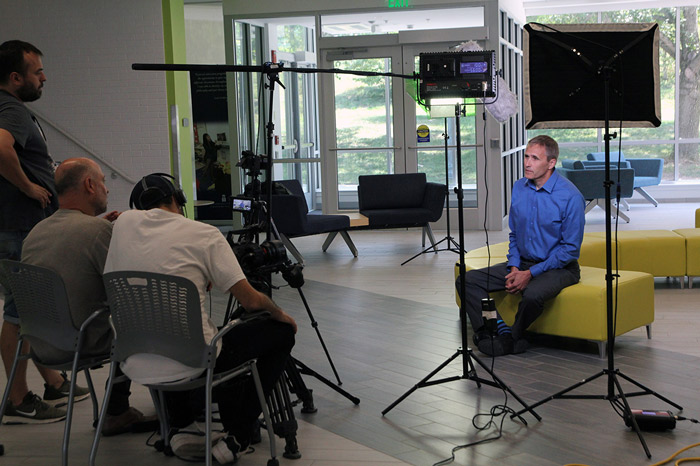


Published on August 08, 2019

History Professor David Frye sat down on July 26 for an interview with producers from Onza Entertainment, who flew in from Spain to get Frye’s perspective on geo-political forces impacting the global order. Onza Entertainment is producing a series for the History Channel titled “A History of the Future.”
The series was conceived by Diego Rubio, professor of applied history and global governance at IE University in Segovia, Spain. The History Channel is part of the A&E Network, which will air the television series this fall and in early 2020 in the United States, Spain, Portugal, Iberia and several other European countries.
“Claudia Lorenzo, who serves as line producer for the series, and I wanted to talk with Professor Frye because he is one of many renowned experts from around the world who is best qualified to discuss the ‘The Future of Globalization’ episode,” said Rubio via telephone from Spain during the interview.
Rubio and his colleagues had read Frye’s new book, “Walls: A History of Civilization in Blood and Brick,” which has received rave reviews from around the world. New York Magazine, the History Book Club, Booklist and Kirkus Review are among the many literary organizations that have written glowing reviews of the book. The book has been ranked one of the “20 best books of 2018,” and best-selling author and historian Tom Holland praised it as “a haunting and brilliant achievement.”

Another insightful review came from Barry Strauss, author of “The Death of Caesar: The Story of History’s Most Famous Assassination.” Strauss commented that Frye “writes . . . about what lies on either side of them (walls) with so much grace and insight that you hardly noticed that 4,000 years of history have passed, and now you have to rethink all your perceptions.”
Ferran Estelles, director of content for Onza Entertainment, said, “We wanted Professor Frye to share his wisdom and reflect on how some historical events can shed significant light on the societal, political and economic changes that the near future will bring to the international order, i.e., power balances, migration, trade and so on.”
During the interview, Frye said walls have shaped human behavior throughout history. He said in ancient times, walls were on every continent. They were not controversial; in many instances, walls created the security needed for citizens to safely pursue art, culture and commerce. “Without walls, there would have been no Chinese scholars, Babylonian mathematicians or Greek philosophers.”
Written by Dwight Bachman